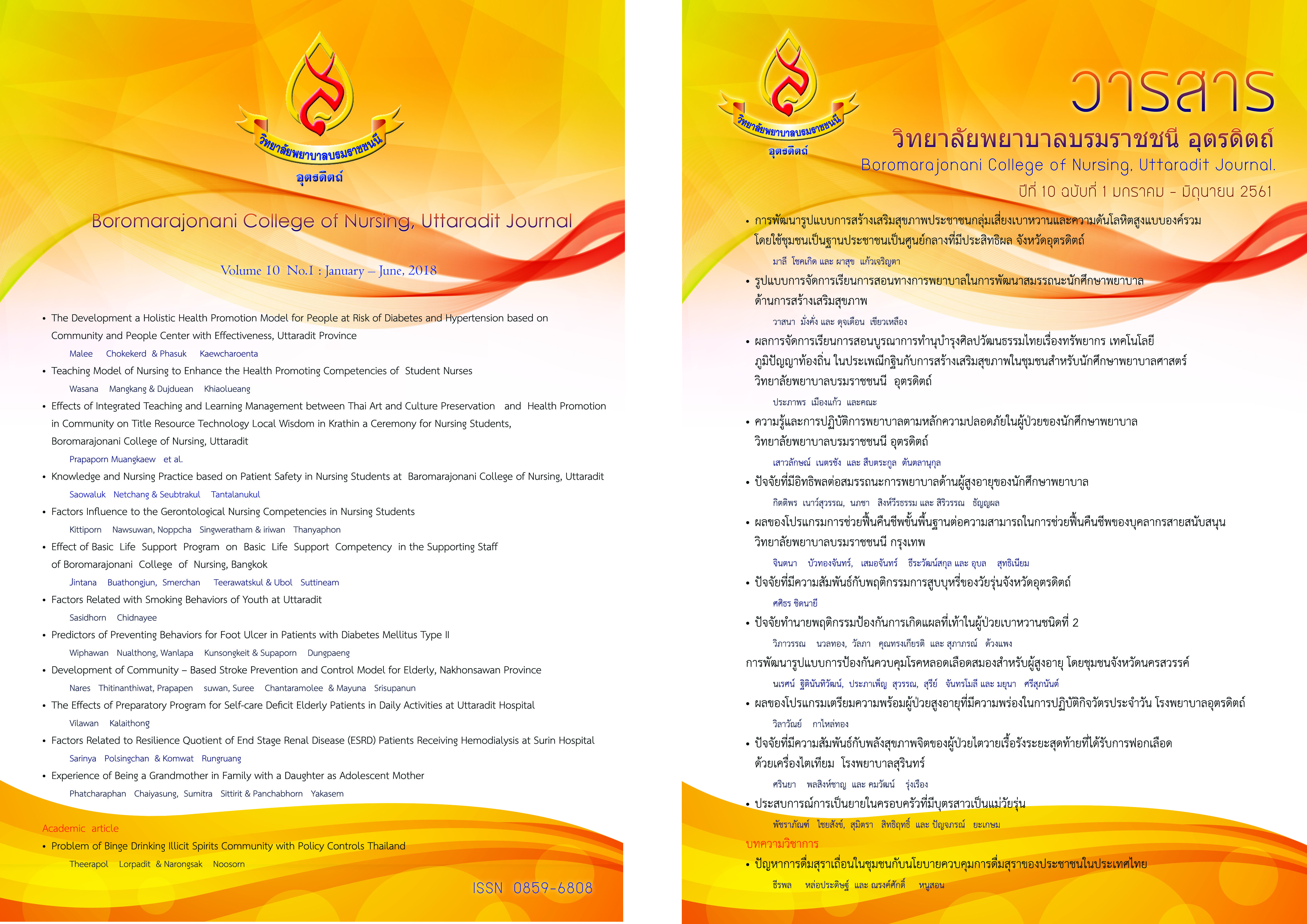ปัจจัยที่มีความสัมพันธ์กับพลังสุขภาพจิตของผู้ป่วยไตวายเรื้อรังระยะสุดท้าย ที่ได้รับการฟอกเลือดด้วยเครื่องไตเทียม โรงพยาบาลสุรินทร์
Main Article Content
บทคัดย่อ
การวิจัยนี้เป็นการวิจัยเชิงพรรณนา มีวัตถุประสงค์เพื่อศึกษาระดับพลังสุขภาพจิตและปัจจัยที่มีความสัมพันธ์กับพลังสุขภาพจิตของผู้ป่วยไตวายเรื้อรังระยะสุดท้ายที่ได้รับการฟอกเลือดด้วยเครื่องไตเทียม กลุ่มตัวอย่าง คือ ผู้ป่วยไตวายเรื้อรังระยะสุดท้ายที่ได้รับการฟอกเลือดด้วยเครื่องไตเทียม ที่ศูนย์ไตเทียมโรงพยาบาลสุรินทร์ จำนวน 41 คน ซึ่งได้มาจากการสุ่มอย่างง่าย เครื่องมือที่ใช้ในการวิจัย ประกอบด้วย
4 ส่วน ดังนี้ 1) ข้อมูลส่วนบุคคล 2) แบบประเมินความเครียด 3) แบบประเมินความซึมเศร้า และ
4) แบบสอบถามพลังสุขภาพจิต (RQ) หาค่าความเชื่อมั่นของแบบสอบถาม 3 ฉบับโดยใช้สัมประสิทธิ์อัลฟาของครอนบาค ได้เท่ากับ .89 .81 และ .91 ตามลำดับ สถิติที่ใช้ในการวิเคราะห์ข้อมูลประกอบด้วย ค่าร้อยละ ค่าเฉลี่ย ค่าเบี่ยงเบนมาตรฐาน และหาความสัมพันธ์โดยใช้สถิติสัมประสิทธิ์สหสัมพันธ์ของเพียร์สัน (r) และการทดสอบไคสแควร์ ( )
ผลการวิจัยพบว่า
1) ระดับพลังสุขภาพจิตของผู้ป่วยโรคไตวายเรื้อรังระยะสุดท้ายที่ได้รับการฟอกเลือดด้วยเครื่องไตเทียม ส่วนใหญ่มีระดับพลังสุขภาพจิต อยู่ในเกณฑ์ปกติ (ร้อยละ 75.61) และมีระดับพลังสุขภาพจิต ที่สูงกว่าเกณฑ์ปกติ จำนวน 6 คน (ร้อยละ 14.63) ซึ่งเป็นเพศหญิงมากกว่าเพศชาย (ร้อยละ 16.67 และ 11.77 ตามลำดับ)
2) สถานภาพสมรส ระดับการศึกษา รายได้ต่อเดือน ความเครียด และความซึมเศร้า มีความสัมพันธ์กับพลังสุขภาพจิตอย่างมีนัยสำคัญทางสถิติที่ระดับ .05
ข้อเสนอแนะจากผลการวิจัย พยาบาลผู้ที่ให้การดูแลผู้ป่วยไตวายเรื้อรังระยะสุดท้ายที่ได้รับการรักษาด้วยการฟอกเลือดด้วยเครื่องไตเทียมควรจัดทำโปรแกรมในการส่งเสริมพลังสุขภาพจิตให้อยู่ในระดับที่สูงขึ้น และควรคำนึงถึงปัจจัยด้านสถานภาพสมรส ระดับการศึกษา รายได้ต่อเดือน ความเครียด และความซึมเศร้าขณะใช้โปรแกรมในการส่งเสริมพลังสุขภาพจิต
Article Details
บทความหรือข้อคิดเห็นใดใดที่ปรากฏในวารสารวิจัยการพยาบาลและวิทยาศาสตร์สุขภาพ เป็นวรรณกรรมของผู้เขียน ซึ่งบรรณาธิการหรือสมาคมศิษย์เก่า ไม่จำเป็นต้องเห็นด้วย และบทความที่ได้รับการตีพิมพ์เผยแพร่ถือเป็นลิขสิทธิ์ของวารสารวิจัยการพยาบาลและวิทยาศาสตร์สุขภาพ
เอกสารอ้างอิง
2 Ananpatiwet, S., Pengsa-ium, V., & Akrasthitanon, C. (2011). Comparison Study of Resilience Quotient (RQ) Before and After Mental Health & Psychiatric Nursing Practicum Among Junior Nursing Students, St Theresa International College. Journal of Nursing and Education, 4(1), 39-51.(in Thai)
3. Department of mental health. (2009). RQ counseling. Ministry of public health. (In Thai)
4. Department of mental health. (2014). Guidelines for surveillance for depression in the province (Revised edition 3/2014). Department of Mental Health, Ministry of Public Health. (In Thai)
5. Doungyota, T. (2010). A study and development of resilience of psychiatric patient caregivers through individual counseling. (Dissertation for the Doctor of Education in counseling psychology, Srinakharinwirot University). (in Thai)
6. Grotberg, E.H. (1995). A Guide to Promoting Resilience in Children: Strengthening the Human Spirit. Netherland: Bernard van Leer Foundation.
7. Grotberg, E.H. (2003). Resilience for Today: Gaining Strength from Adversity. Westport: Praeger.
8. Iameong, S., Krieng, T., & Prasertpornsin, K. (2012). Pratical Dialysis.Bangkok:Text and Journal Publication Co., Ltd. (in Thai)
9. Jannoppakhun, J., & Supapitiporn, S. (2015). Predictive factors for the resilience quotient of new nursing graduates on rotational duty at Chulalongkorn hospital. Thai Journal of Nursing Council, 30(2), 113-126. (in Thai)
10. Jittinun, A. (2008). Textbook of Peritoneal Dialysis. Bangkok:Text and Journal Publication Co., Ltd. (in Thai)
11. Parayat, C. (2015). Predictive factors of resilience among elderly. (Master of Nursing Science in Gerontological Nursing, Burapha University). (in Thai)
12. Pengsa-imm, V., Chaiyasung, P., & Sangpawe, K. (2014). The Resilience quotient model among second year nursing student at St Theresa International College. Boromarajonani College of Nursing, Uttaradit Journal, 6(2), 1-8. (in Thai)
13. Srisaard, B. (1992). Introduction of research. 3rd edition. Bangkok:Suviriyasarn. (in Thai)
14. Sriyarat, K., & Jiebna, V. (2015). Relationships between resilience quotient (RQ) and perceived self-efficacy and academic achievement in psychiatric nursing practicum course of senior nursing students, Thai Red Cross College of Nursing. The Journal of Psychiatric Nursing and Mental Health, 29(1), 76-92. (in Thai)
15. Ukati, K., & Chantajirakhovit, N. (2007). Self-care agency and quality of life in end stage renal disease patients undergoing continuous ambulatory peritoneal dialysis. Songklanagarind Medical Journal ,25(3), 171-177. (in Thai)
16. Wareesangtip, J.(2010). The improvement of the quality of life of the End Stage Renal Disease patients by dhamma practice. (Doctoral Dissertation, Mahachulalongkornrajavidyalaya University). (in Thai)
17. Well, M. (2010). Resilience in older adults living in rural, suburban, and urban areas. Journal of Rural Nursing and Health Care, 10(2), 45-54.


